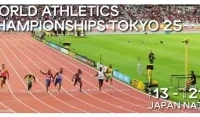The 2025 World Athletics Championships will mark the twentieth edition of the event and are scheduled to take place from 13 to 21 September 2025 in Tokyo, Japan.
Meanwhile, the international governing body, World Athletics, has announced a gene-testing rule for women’s events, effective this September, requiring women athletes to undergo genetic screening to detect the Y chromosome’s SRY gene “to protect the integrity of women’s competition.”
While this policy violates national laws in countries like France and Norway, where genetic testing for non-medical purposes is banned, there are more serious concerns that should be prioritised, such as how athletics as a sport remains fundamentally male-dominated and masculine, despite women’s participation. The real crisis is not eligibility rules – it is the obsession with using male performance as the gold standard for athletic excellence. This deeply embedded mindset undermines the very concept of gender equality in sports and shapes how entire generations view athletic achievement. At the Paris 2024 Championships, Noah Lyles won the men’s 100m sprint in 9.79 seconds, while Julien Alfred claimed the women’s title in 10.72 seconds.
In the long jump, Miltiadis Tentoglou leapt 8.48 meters compared with Tara Davis-Woodhall’s 7.10 meters. When these achievements are displayed side by side, young viewers absorb a dangerous message: that women’s performances are inferior versions of men’s accomplishments. This comparison turns women’s sports into a perpetual consolation prize, reinforcing the stereotype that female athletes are simply weaker versions of their male counterparts. Athletics has historically positioned male achievements as the pinnacle of human potential, with women’s events treated as derivative categories.
This male-centric framework permeates everything from media coverage to commercial investment, creating a hierarchy that suggests men’s sports are inherently more valuable. Consider Shelly-Ann Fraser-Pryce, who achieved an unprecedented feat – becoming the only sprinter in history to win five world titles in the 100m. Despite this dominance exceeding Usain Bolt’s three world titles, she received barely a fraction of the global coverage and commercial recognition afforded to her male counterpart.
The upcoming Tokyo Championships present World Athletics with an opportunity to choose a different path – one that celebrates human athletic potential in all its forms rather than perpetuating gender hierarchies through presentation and recognition. The most powerful change would be to acknowledge that every athlete’s journey begins with a woman. Including mothers’ names alongside athletes in official records would remind audiences that even the strongest and fastest athletes owe their existence to women.
This simple acknowledgement honours the foundational role of mothers while dismantling patriarchal norms that systematically undervalue women’s contributions. When children consistently see women honoured as the source of human potential, it fundamentally reshapes how they understand gender and value. Here’s how results could appear: Men’s Gold Medalists: 100m Sprint | Noah Lyles, s/o Keisha Caine: 9.79s Long Jump | Miltiadis Tentoglou, s/o Stavroula Tentoglou: 8.48m Women’s Gold Medalists: 100m Sprint | Julien Alfred, d/o Ange Alfred: 10.72s Long Jump | Tara Davis-Woodhall, d/o Toya Davis Sr.: 7.10m This recommendation could be implemented for Tokyo 2025, as a powerful way to promote respect for women and inspire young viewers.
Even more crucial is presenting competitive results relative to each event’s winner rather than in absolute terms. The gold medallist’s performance would appear as zero, with all other athletes’ results shown as differences from that standard: Men’s 100m: Noah Lyles: 0s | Kishane Thompson: +0.005s | Fred Kerley: +0.020s Women’s 100m: Julien Alfred: 0s | Sha’Carri Richardson: +0.15s | Melissa Jefferson: +0.20s Men’s Long Jump: Miltiadis Tentoglou: 0m | Wayne Pinnock: -0.12m | Mattia Furlani: -0.14m Women’s Long Jump: Tara Davis-Woodhall: 0m | Malaika Mihambo: -0.12m | Jasmine Moore: -0.14m This reframing would transform how audiences perceive athletic achievement.
Instead of seeing Julien Alfred’s 10.72 seconds as “slower than” Noah Lyles’ 9.79, viewers would see Alfred as the absolute pinnacle of excellence in her category. Such a presentation celebrates winners in their own right without implying that men’s performances should serve as universal benchmarks. This recommendation could be examined for future Championships, such as 2027, to further advance gender equality. These proposals may face resistance from traditionalists, but they neither erase nor diminish past achievements. Instead, they present excellence through a lens of equality rather than hierarchy. Honouring mothers could be implemented immediately for Tokyo 2025, while the presentation of relative results could be tested for future championships like 2027.
By embracing reforms that honour the women who make athletic achievement possible and correct the imbalance in how we present excellence, World Athletics can demonstrate that athletics is not merely about measuring strength or speed, but about affirming human dignity. The true spirit of sport lies not in genetic gatekeeping or hierarchical comparison, but in equality, respect, and celebration of every athlete’s journey from their very first breath. If World Athletics leads this transformation, future generations will inherit a sporting culture that transcends gender barriers and reflects the highest ideals of humanity.
The writer is a transparency and equality advocate and author. The views expressed are personal
